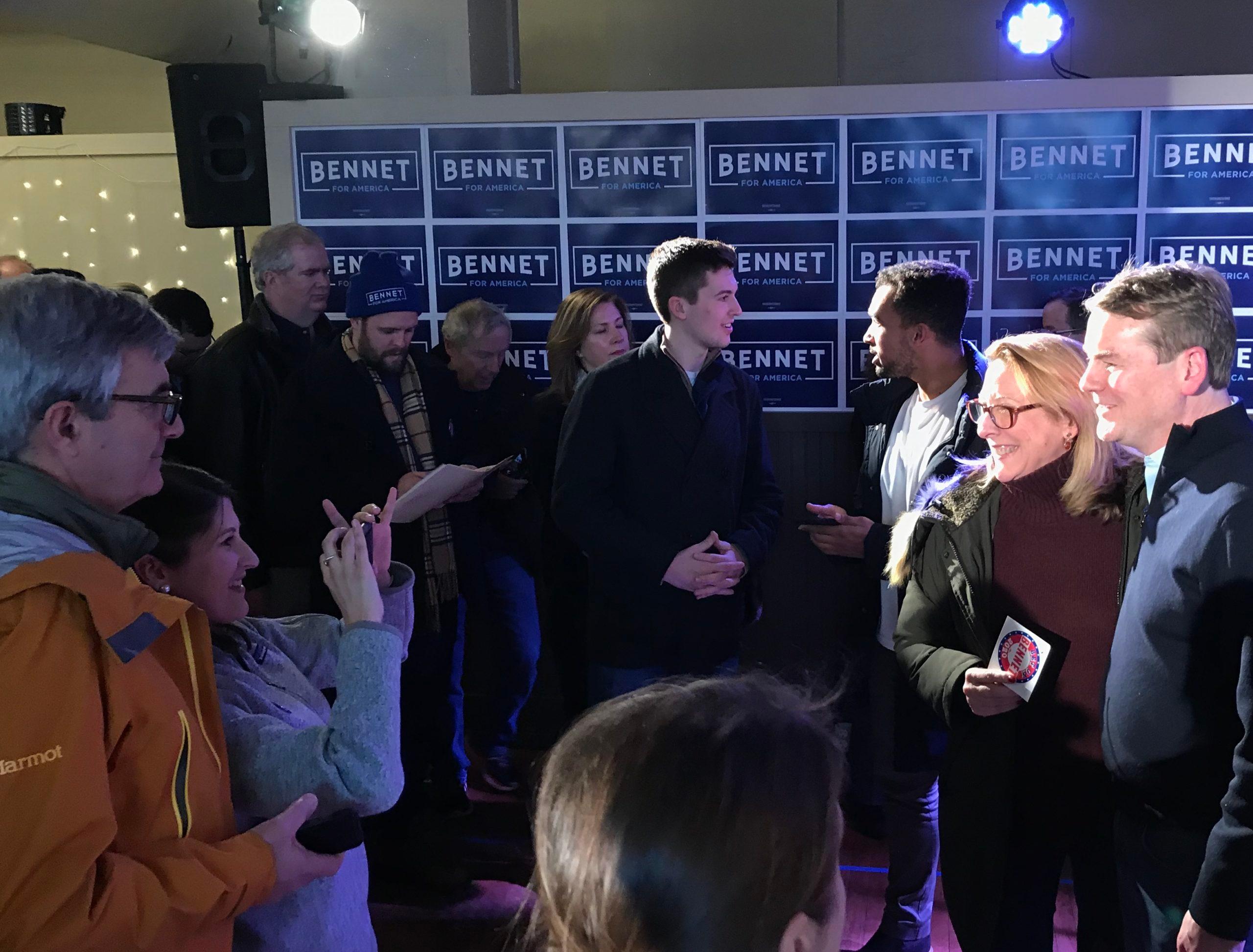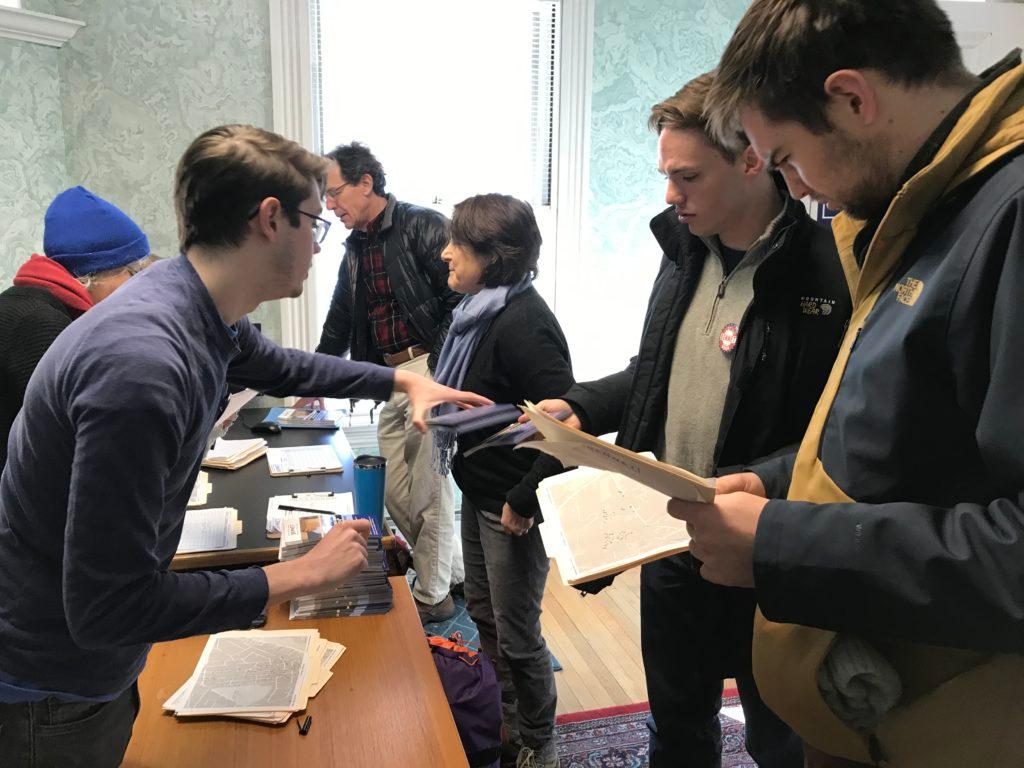
Colorado senator and presidential hopeful Michael Bennet has crisscrossed New Hampshire through snow, sleet and below zero degree temperatures. All that braving of the elements has one goal: to defy the odds and give his campaign a shot in the arm with a strong showing at Tuesday's first-in-the-nation presidential primary.
Over the weekend, in front of a large crowd of friends, supporters and -- most importantly -- undecided New Hampshire primary voters, Bennet made his case for why they should cast their ballot for him in the nation’s first primary. It wasn’t about Bennet’s policy agenda or his resume, although both were on display. It was the big picture question: Who can beat the incumbent, President Donald Trump, in November?
“I have stayed in the race because I really think in this field, I am the person who can beat Donald Trump,” Bennet said to applause.
Underlying his stump speech was an unsaid plea: don’t listen to the polls or the pundits that have written off his campaign and his chances.
“If you defy conventional wisdom and you surprise some people, there is no end to where we can run in this race and I think we can go on and win it,” said Colorado's senior Democratic senator.
Bennet’s banking on New Hampshire’s history of surprises. Some of his major endorses have had surprises here. Fellow Coloradan Gary Hart won the primary and political strategist James Carville helped Bill Clinton, then a little known governor, place second. Carville’s argument now? Get New Hampshire voters to give Bennet a chance.
“All of you can make this thing happen. We don't need a ton,” Carville told voters at a Saturday afternoon rally. “What I know this man needs is he heeds a look and if you give us a vote out of here and if we get people to look at him, then we’re going to win.”
It is a herculean task for a candidate low in the polls, low on money and low on time.
Campaign manager Daniel Barash told Bennet volunteers that voters might use his low poll numbers as a reason not to support the candidate.
“Screw that logic,” Barash said. “This thing is all in flux right now. So much of this is an expectations game and exceeding expectations, which we are very well poised to do”

The campaign has increased its footprint over the last several weeks, but it’s still smaller than the frontrunners. And that’s had an effect.
At a local cafe that is frequented by presidential candidates, Marcel Jackson of Manchester confused Bennet with fellow Coloradan John Hickenlooper, who dropped out of the race in the summer. Jackson's wife jumped in to correct him, saying Bennet was the former school superintendent.
“I was going to say governor, but see that’s the problem I don’t know anything about him,” Jackson went on to say.
But the response that’s got to be the most frustrating for Bennet and his supporters are the ones where people like what he has to say, but won’t cast a vote for him on Tuesday.
“I just worry that he doesn’t have enough people that are going to support him to carry him through,” said Lee Williamson of Hooksett.
It’s the viability argument.
Many voters who have heard of Michael Bennet or attended one of his events, like what he has to say. But they share the same concerns of how a progressive candidate’s message might falter in purple or red states.
Kristen Bannister from Manchester is one of those voters. She’s torn between Elizabeth Warren and Bennet. She heard about Bennet from one of her work friends — a Cory Booker supporter. Apparently, Bennet reached out when the New Jersey senator dropped out of the race.
“I feel a little bit, unfortunately, he hasn’t gotten enough steam to be a viable candidate,” said Bannister at a Warren debate party. “So, do I vote for a candidate I think is viable, Warren, versus making a statement with Bennet that we need some healing that a progressive candidate might not bring about?”
Bennet supporter Hugh Curley from Epsom has an answer to the viability argument.
“I think our role is to make someone viable, not to jump on the viability train,” Curley said. “I think that's a danger of the national media coming in and saying, Oh, pick a winner, pick a winner. No, we should be making viable candidates.”
Especially since the Iowa Caucus debacle provides New Hampshire with the first real opportunity to show who the viable candidates are. Curly thinks if Bennet can get 5-7 percent of the vote on Tuesday, he would have enough momentum to move into South Carolina.
The problem is several candidates are trying for the same result.
Sue Klein from Boston said if Bennet makes it to Super Tuesday, he has her vote. She attended the rally, with her friend Lee Williamson. Bennet impressed both Klein and Williamson, who say he has one advantage over a couple of the other front runners.
“Michael Bennet is young. He’d be a great age to be president, but he’s got time in the future as well, I think,” Klein said.
“Right, I was thinking he could be building for next time too, he has time,” Williamson agreed.
Bennet is heading into Tuesday’s primary talking to as many voters as he can. Hoping it will pay off. He spent the weekend criss-crossing the state, including a stop in Dixville Notch, where residents vote at midnight.
But the wariness of constantly being asked how he plans to win when he hasn’t gained traction as quickly as other candidates, has also begun to show. This weekend, Bennet said he’d support whoever the democratic nominee is come November.
It was a statement echoed by many of his supporters and undecided democratic voters, too.









